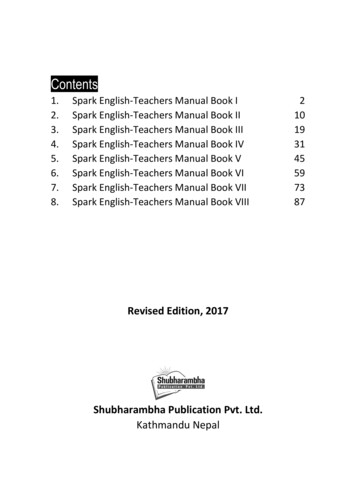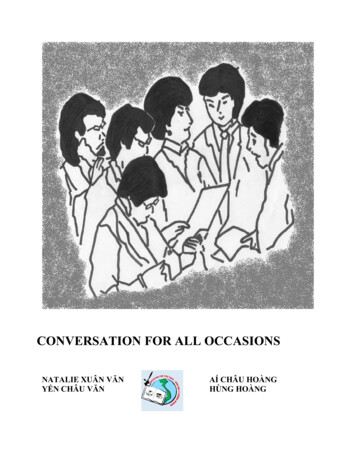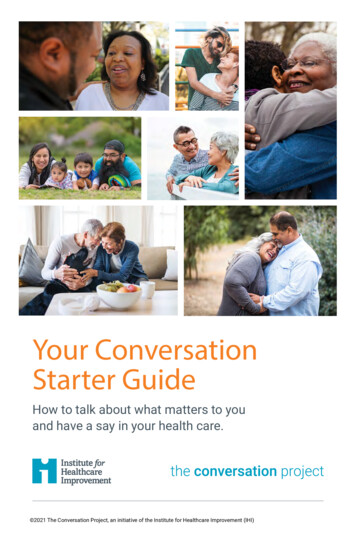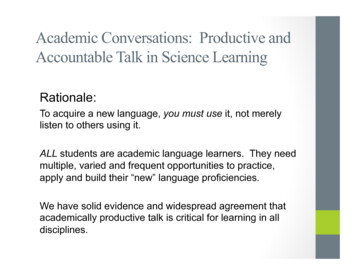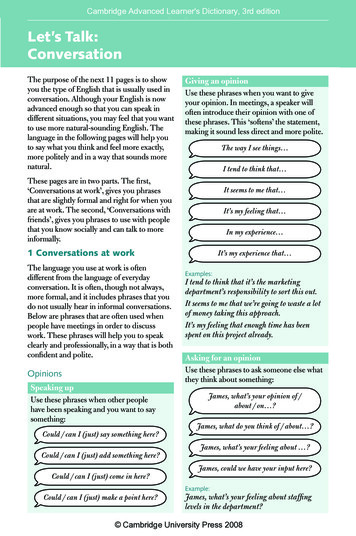
Transcription
Cambridge Advanced Learner'sDictionary, 3rd edition[EH2]Let’s Talk:ConversationThe purpose of the next 11 pages is to showyou the type of English that is usually used inconversation. Although your English is nowadvanced enough so that you can speak indifferent situations, you may feel that you wantto use more natural-sounding English. Thelanguage in the following pages will help youto say what you think and feel more exactly,more politely and in a way that sounds morenatural.Giving an opinionUse these phrases when you want to giveyour opinion. In meetings, a speaker willoften introduce their opinion with one ofthese phrases. This ‘softens’ the statement,making it sound less direct and more polite.The way I see things I tend to think that These pages are in two parts. The first,‘Conversations at work’, gives you phrasesthat are slightly formal and right for when youare at work. The second, ‘Conversations withfriends’, gives you phrases to use with peoplethat you know socially and can talk to moreinformally.It seems to me that It’s my feeling that In my experience 1 Conversations at workThe language you use at work is oftendifferent from the language of everydayconversation. It is often, though not always,more formal, and it includes phrases that youdo not usually hear in informal conversations.Below are phrases that are often used whenpeople have meetings in order to discusswork. These phrases will help you to speakclearly and professionally, in a way that is bothconfident and polite.OpinionsSpeaking upUse these phrases when other peoplehave been speaking and you want to saysomething:Could / can I (just) say something here?Could / can I (just) add something here?Could / can I (just) come in here?It’s my experience that Examples:I tend to think that it’s the marketingdepartment’s responsibility to sort this out.It seems to me that we’re going to waste a lotof money taking this approach.It’s my feeling that enough time has beenspent on this project already.Asking for an opinionUse these phrases to ask someone else whatthey think about something:James, what’s your opinion of /about / on ?James, what do you think of / about ?James, what’s your feeling about ?James, could we have your input here?Example:Could / can I (just) make a point here?James, what’s your feeling about staffinglevels in the department? Cambridge University Press 2008
Cambridge Advanced Learner's Dictionary, 3rd editionAgreeingDisagreeingAgreeingUse these phrases to agree with whatsomeone has said:I agree (with you).(I think) you’re right.I tend to agree. / I tend to agree with Anna.I’m with Anna on this one.DisagreeingUse these phrases when you disagree withwhat someone has said:Note: In a work meeting, people oftendisagree in an indirect way. They usuallyavoid very strong, definite phrases, suchas ‘I completely disagree,’ as these cansound rude.I’m afraid I don’t / can’t agree withyou there.I’m sorry, I don’t agree with you there.Agreeing stronglyUse these phrases when you agree stronglywith someone and want to show it:I have to say, I disagree with you there.I’m not sure I agree with you.Absolutely!I’m not sure about that.Exactly!I’m not sure that’s true.I quite agree!I totally agree with you.I’m in complete agreement with you.I couldn’t agree more!I take a (slightly) different viewon this.I don’t know. I tend to think that theopposite is true.Examples:A: Money spent on training is alwaysa good investment.B: I’m not sure about that. I think itdepends on the quality of the training.A: In my experience, customers are lookingfor quality in a product and they’ll payextra for it.B: I take a different view on this. I think thelower price is mainly what sells the product. Cambridge University Press 2008
Cambridge Advanced Learner's Dictionary, 3rd editionDisagreeing stronglyUse this phrase when you disagree stronglywith what someone has said:I’m sorry but Responding to an interesting remarkUse these phrases when someone has saidsomething interesting that you had notthought of:(Yes,) that’s true.Note that if you say ‘I’m sorry but ’ at thebeginning of a sentence, it does not reallymean that you are sorry. In fact it is a way ofemphasizing that you are going to disagreewith what someone has said.That’s very true.That’s a point!Examples:I’m sorry but I can’t agree with you.I’m sorry but I just don’t think it’s a gooduse of our time.I’m sorry but the point you make simplydoesn’t apply to our department.ListeningListening to someone’s opinionUse these phrases when you understandwhat someone has said but still disagree:Good point!Example:That’s very true – I hadn’t thought of that.Repeating and explainingRepeatingUse these phrases when you want to talkagain about something that was said before:If I could just go back to something Juliasaid / mentioned earlier I see / get your point but I see / get what you mean but Going back to what Julia said/mentioned earlier I see / get what you’re saying but Thinking about what Julia said /mentioned earlier I see / get where you’re coming frombut As Julia said earlier Note that ‘get’ is often used in these phrasesinstead of ‘see’ but sounds more informalthan ‘see’.Examples:I see your point – it is a lot of money – but Istill think it’s an investment worth making.I get what you’re saying – she’s not the easiestperson to work with – but I don’t think wehave any choice here.Examples:Going back to what Julia said earlier,perhaps it would be better to keep some of thismoney back for training purposes.As Julia said earlier, we can’t get the staffbecause we don’t pay enough. Cambridge University Press 2008
Cambridge Advanced Learner's Dictionary, 3rd editionNot hearingUse these phrases when you did not hearwhat someone said:(Sorry,) I missed that.(Sorry,) I didn’t catch that.(I’m sorry,) could you repeat that,please?(I’m sorry,) could you say that again,please?Asking for more informationUse these phrases when you want someoneto tell you more about something:Angela, could you say a little bit moreabout ?Angela, could you explain in a bitmore detail?Examples:I’m afraid I don’t know much about the newsystem – could you say a little more about it,Peter?Not understandingUse these phrases when you you did notunderstand what someone said:Making sure that you understandUse these phrases when you think youunderstand something but want to makesure:I’m sorry, could you explain that again,please?So, what you’re saying, Paul, is that Is that right?I’m not sure I understand what youmean (by) Just to recap ( repeat the main points),you would like to ? Is that right?Could you run that by me again, please?So, Paul, just to make sure I’veunderstood this / got this right I’m afraid I don’t follow you.I’m sorry, you’ve lost me.Examples:So, am I right, Paul, in saying that youwant to ?Examples:I’m not sure I understand what you mean by‘type A projects.’ Would you mind explainingthat, please?Could you run that by me again, please? Imean the figures part.So, Paul, what you are saying is that we needmore money in the training budget. Is thatright?So, Paul, just to recap, we need a biggertraining budget but we could probably reducethe marketing spend? Cambridge University Press 2008
Cambridge Advanced Learner's Dictionary, 3rd editionBeing misunderstoodUse these phrases when someone has notunderstood you:That’s not quite what I meant.I think you’ve misunderstood me.Perhaps I didn’t explain thisvery clearly.Examples:I think you’ve misunderstood me – I wasn’ttalking about the changes that are proposedin this report.2 Conversations with friendsThe next six pages will give you a range ofphrases for speaking in different situations.All these phrases are used in spoken Englishtoday and will help you to speak in a waythat sounds friendly, polite and natural.Starting and ending a conversationMeeting someone by chanceUse these phrases when you meet someoneyou know by chance:Hello / Hi! I haven’t seen you in ages!Hello / Hi! I was just thinking about youthe other day.Not knowingUse these phrases when you are not surewhat you think or who you agree with:I don’t know what to think about this.Hello / Hi! I thought I might see youhere.Hello / Hi! What a nice surprise tosee you here.I’m in two minds about this.*(humorous) Hello, stranger!I’m not sure where I stand on this.*Long time, no see.I can see both sides of the argument.Examples:I’m in two minds about this issue. Certainlywe need publicity but is this the best use ofour money?I’m not sure where I stand on this. Is it betterto invest now or see how the market goes anddecide later?* These two phrases are said to a personthat you have not seen for a long time. Cambridge University Press 2008
Cambridge Advanced Learner's Dictionary, 3rd editionBefore saying goodbyea. Use these phrases when you have beenspeaking to someone but now need to leavethem:(It was) nice / good to see you.I’m afraid I have to go now, but it’s beenreally nice seeing you.During a conversationRemembering and forgetting somethingin a conversationa. Use these phrases when you suddenlyremember something that you want to say:I was going to / meaning to ask you I know what I wanted to ask you I’m sorry, I have to dash( leave quickly).Oh, and while I think of it *Anyway, I can see that you’re busy.Oh yes, I remember what I was going toask / tell you *Anyway, I’ll let you get on. / I’d betterlet you get on ( I will let you leave or dowhat you have to do).*Anyway, I won’t take up any moreof your time.* In order to seem polite, speakers oftentry to end a conversation by saying that theperson they are talking to needs to go. Notethat the word ‘anyway’ is often used at thestart of this type of sentence.b. Use these phrases when you have beentalking to someone for a short time and youwould like to see them for longer next time:b. Use these phrases when you forget whatyou wanted to say:What was I saying? Oh yes I’ve completely forgottenwhat I was saying.My mind’s gone blank.I’m sure there was something I meantto tell / ask you.It would be nice to catch up sometime( talk about things that we have donesince we last saw each other).It would be nice to havea proper catch-up sometime. Cambridge University Press 2008
Cambridge Advanced Learner's Dictionary, 3rd editionJoining two parts of a conversationUse these phrases when you want tointroduce a new subject that is related to theone that you are talking about:Making arrangements continued Use these phrases to say that a dateis possible:That week’s good / fine / OK for me.I’ve had this jacket for almost ten years.That week’s a possibility.Speaking / Talking of clothes, I like thatsweater you’re wearing.He takes really good photos. While we’reon the subject, did you get the photosI sent you last week?I don’t have anything / much onthat week.Use these phrases to decide a date :Let’s say Friday 16th.Making arrangementsUse these phrases to talk about possibledates to meet someone. All of these phrasesmean ‘Can you meet during the week thatstarts Monday 12th?’Is the week starting Monday 12thany good for you?How does the week startingMonday 12th sound?How are you fixed for the weekstarting Monday 12th?Use these phrases to say that a dateis not possible:That week might be a bittricky / difficult.OK, let’s make it Friday 16th.Friday 16th it is then.Shall we pencil in Friday 16th( say Friday 16th for now, although itmay change later)?Let’s say Friday 16th for now( the date may change later).Let’s say Friday 16th and I’ll get backto you if there’s a problem.Use this phrase to check nearer the date thatthe arrangement is still possible:Are you / we still on for ( able to dowhat we have planned) this Friday?I’ve got a lot on ( I am busy) that week.Actually, I’m a bit busy that week. Cambridge University Press 2008
Cambridge Advanced Learner's Dictionary, 3rd editionResponding when someoneis speaking to youAsking for more informationUse these phrases when you want thespeaker to explain more:AgreeingUse these phrases when you agree withsomeone’s opinion:You’re (absolutely) right.Why’s that?Absolutely!Why do you think that is?True!I wonder why that is?That’s true!Listening and interestedUse these phrases when you want thespeaker to know that you are still listeningand interested:That’s exactly how I feel.Ah!Really?Yes?Is that right?UnderstandingUse these phrases to say that youunderstand a problem or situation thatsomeone has been explaining to you:I see.Right!Now I’m with you ( I understand nowthough I didn’t before). Cambridge University Press 2008
Cambridge Advanced Learner's Dictionary, 3rd editionSympathizinga. Use these phrases to show that you feelsorry for someone who has a problem.Note that these phrases are not right if theproblem is very serious.Showing amusementUse these phrases to show that you thinkwhat someone has told you is funny:That’s hilarious!Oh no!That’s really / very funny!Poor you!How funny !What a shame!That’s made my day!What a nuisance / hassle!That’s awful / terrible!That sucks! (AmE informal)Showing surprise or shockUse these phrases to show that you aresurprised or shocked at what someone hastold you:What a pain!No!What a drag!Never!Tell me about it ( I have had the sameproblem as you, so I understand)!You’re joking!You’re kidding!b. Use these phrases to show sympathy forsomeone who has a serious problem:You’re not serious!I am sorry.That’s unbelievable!I’m (very / so) sorry to hear that.I don’t believe it!Example:A: Karl’s mother died at the weekend.B: I’m so sorry to hear that.Example:A: They’re making a hundred and fifty peopleredundant.B: You’re kidding!A: No, I read it in the paper last night. Cambridge University Press 2008
Cambridge Advanced Learner's Dictionary, 3rd editionDealing with an interruptionUse these phrases when someone wasspeaking to you and you have beeninterrupted, for example by a phone. Youwant the first person to continue speaking:Refusing an offer of food or drinkUse these phrases to refuse food or drinkthat someone has offered you:(No,) I’m all right, thanks.Sorry, Sara, what were you saying?(No,) I’m fine, thanks.Sorry, Sara, you were saying?Not for me, thanks.Sorry, Sara, you were telling me aboutyour mother.No thanks, I’ve just had lunch.Example:Conversational ‘softeners’The phrases below are used in situationsin which you do not want to upset someoneor seem rude.Refusing an offer of helpUse these phrases when someone has offeredto help you but you do not need their help:(to start a sentence)A: Would you like some coffee, Julia?B: I’m all right, thanks.Refusing more food or drinkUse these phrases when you do not wantany more food or drink:I’ve had plenty, thank you / thanks.No, that was delicious but I couldn’tmanage any more, thanks.You’re all right It’s all right / OK Don’t worry, I’ll be OK Dealing with apologiesUse these phrases when someone apologizesand you want to let them know that you arenot angry:That’s all right.(to end a sentence) but thanks anyway.Not to worry. but I appreciate the offer.Don’t worry (about it). but thanks for the offer.It doesn’t matter. but it’s very kind of you to offer.Example:A: Would you like some help with thepacking?B: It’s all right – my neighbour’s offered tohelp out. But thanks anyway.It is usual to add a sentence or twoexplaining why you are not angry with theperson who has said sorry.Example:A: I’m sorry I didn’t make it to your party onFriday.B: That’s all right – I know you’re busy at themoment. Cambridge University Press 2008
Cambridge Advanced [EH12]Learner's Dictionary, 3rd editionlet’s talk: conversationOf courseThe following examples will show you howto use the phrase ‘of course’ correctly and ina way that sounds natural. Remember thatthe phrase ‘of course’ is not used for agreeingwith someone else’s opinion. In fact it caneven sound slightly rude when used in thisway. The other thing to remember is that‘of course’ should not be used for acceptingan offer. For example, do not say ‘of course’when you are offered a drink as this cansound rude. These are the different ways inwhich ‘of course’ can be used correctly:Of course1. Used to say politely that someonecan do or have something:A: Can I borrow your pen?B: Of course (you can).2. Used to state a fact that most peoplealready know:Of course continued 5. Used for disagreeing strongly withsomething that someone says. Note thatthis use can sometimes sound rude and isgenerally used between people who knoweach other well:A: Your mother doesn’t even like me!B: Of course she likes you!A: I’m too fat to wear anything like that.B: Of course you’re not!6. Used when someone tells you that they orsomeone else felt angry or sad and you wantto show you understand how they feel:A: My mother was upset because mybrother wasn’t there.B: Of course.A: I just feel so angry with her.B: Of course.The Second World War ended,of course, in 1945.Of course you shouldn’t eat too much fat.3. Used for saying that something thathappened was not surprising:We got to the station half an hour lateso, of course, we missed our train.4. Used to mean ‘certainly’ when someoneasks you a question or asks you to dosomething:A: Do you love me?B: Of course I love you!A: Could you help out on Saturday?B: Of course! Cambridge University Press 2008
Conversation The purpose of the next 11 pages is to show you the type of English that is usually used in conversation. Although your English is now advanced enough so that you can speak in different situations, you may feel that you want to use more natural-sounding English


